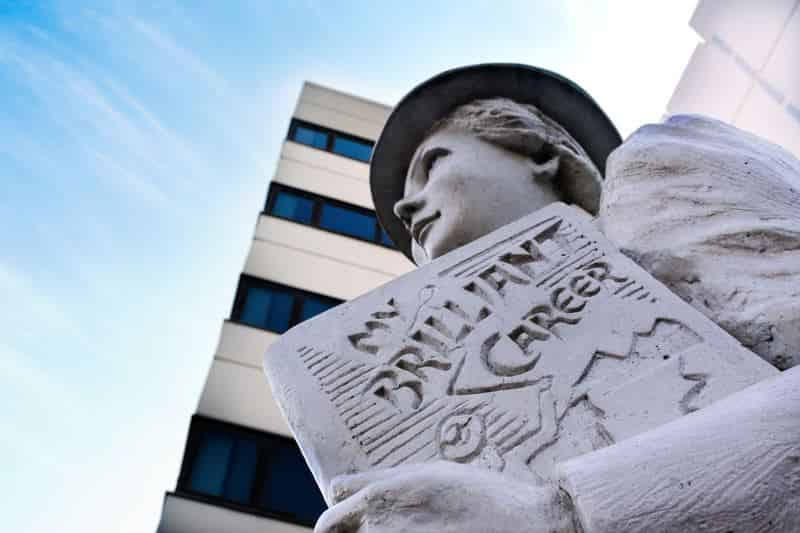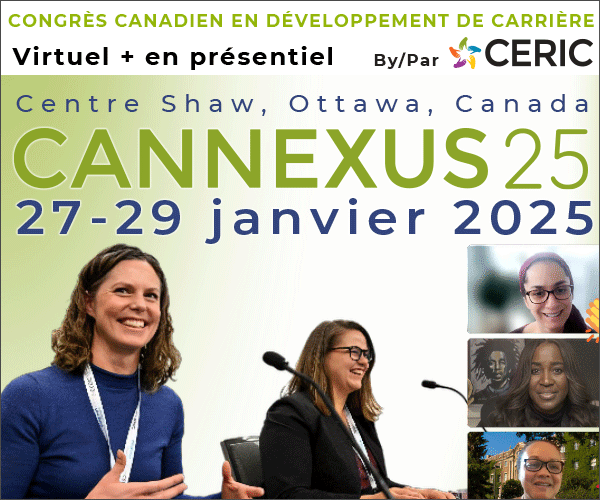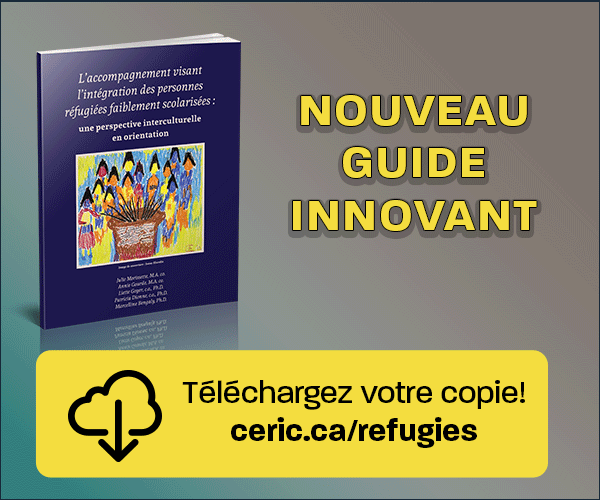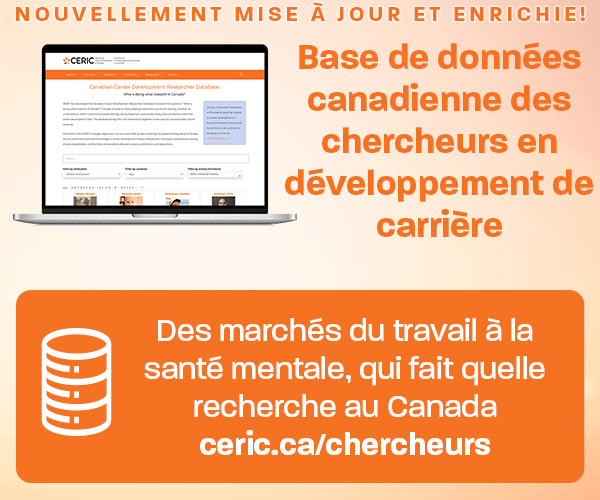La formation des enseignants en information scolaire et professionnelle : développer les perceptions, le savoir et les compétences de base
Mots-clés :
formation professionnelle, compétences, connaissance, enseignants en formation initiale, enseignants, jeunesse, école secondaire, l'éducation k-12Résumé
Students in the K-12 educational system benefit from access to high quality career support (Campbell & Ungar, 2008). However, students report that they are not able to access effective career services (Campbell & Ungar, 2008). Either this support is unavailable or if it is available it is ineffective (Domene, Shapka, & Keating, 2006; Osborn & Baggerly, 2004). This article describes a pilot project offered by the Faculty of Education at the University of Lethbridge that seeks to address these issues. Through this pilot project pre-service teachers receive training in career education and learn to infuse career support in regular curriculum. This article examines the findings of a research project that investigated whether this pilot project effectively prepares pre-service teachers to integrate career education into regular curriculum. The findings suggest that this pilot project helped preservice teachers acquire the perspectives and skills required to effectively support students in their career explorations and planning.
Références
Arthur, N., & Collins, S. (2011). Infusing culture in career counseling. Journal of Employment Counseling, 48, 147-149
Arthur, N., & Collins, S. (2010). Introduction to culture-infused counselling. In N. Arthur & S. Collins (Eds.), Culture-infused counselling (2nd ed.) (pp. 3- 25). Calgary, AB: Counselling Concepts.
Bardick, A., Bernes, K., Magnusson, K., & Witko, K. (2005). Parents’ perceptions of their role in children’s career planning. Guidance & Counselling, 20, 3-4, 152-157.
Bloxom, J., Bernes, K., Magnusson, K., Gunn, T., Bardick, A., Orr, D., & McKnight, K. (2008). Grade 12 student career needs and perceptions of the effectiveness of career development services within high schools. Canadian Journal of Counselling, 42, 2, 79-101.
Borgen, W., & Hiebert, B. (2006). Career guidance and counselling for youth: What adolescents and young adults are telling us. International Journal for the Advancement of Counselling, 28, 389-400.
Bright, J., & Pryor, R. (2005). The chaos theory of careers: A user’s guide. The Career Development Quarterly, 53, 291-305.
Bright, J., & Pryor, R. (2011). The chaos theory of careers. Journal of Employment Counseling, 48, 163-166.
Campbell, C., & Ungar, M. (2008). The decade after high school: A professional’s guide. Retrieved from http://www.michaelungar.com/files/the_decade_after_high_school_professionalsguide.pdf
Domene, J., Shapka, J., & Keating, D. (2006). Educational and career-related help seeking in high school: An exploration of students’ choices. Canadian Journal of Counselling, 40, 3,145-159.
Downing, J., & D’Andrea, L. (1994). Parental involvement in children’s career decisions. Journal of Employment Counselling, 31, 115-126.
Feller, R. (2003). Aligning school counsellor, the changing workplace, and career development assumptions. Professional School Counselling, 6, 262-271.
Government of Alberta. (2010). Inspiring action on education. Retrieved from http://ideas.education.alberta.ca/media/2905/inspiringaction%20eng.pdf
Green, A., & Keys, S. (2001). Expanding the developmental school counselling paradigm: Meeting the needs of the 21st century student. Professional School Counselling, 5, 84-95.
Guichard, J. (2009). Self-constructing. Journal of Vocational Behavior, 75, 251-258. doi:10.1016/j.jvb.2009.03.004
Gyspers, N. (2001). School guidance and counselling in the 21st century: Remember the past into the future. Professional School Counselling, 5, 96-105.
Hartung, P.J., Porfeli, E.J., & Vondracek, F.W. (2008). Career adaptability in childhood. Career Development Quarterly, 57, 63-74.
Jarvis, P. (2006). Career management paradigm shift: Prosperity for citizens, windfalls for government. The Alberta Counsellor, 29, 1, 3-11.
Kallenberg, A.L. (2009). Precarious work, insecure workers: Employment relations in transition. American Sociological Review, 74, 1-22. doi: 10.1177/000312240907400101
Magnusson, K., & Bernes, K. (2002). Comprehensive career needs survey: An overview. The Alberta Counsellor, 27, 2, 12-15.
McMahon, M. (2011). The systems theory framework of career development. Journal of Employment Counseling, 48, 170-172.
Niles, S., & Harris-Bowlsbey, J. (2005). Career interventions in the 21st century (2nded.). Upper Saddle River, NJ: Pearson.
Noddings, N. (2003). Happiness and education. Cambridge, UK: Cambridge University Press
Osborn, D., & Baggerly, J. (2004). School counsellors’ perceptions of career counselling and career testing: Preferences, priorities, and predictors. Journal of Career Development, 31, 45-49.
Patton, W., & McMahon, M. (2006). The systems theory framework of career development and counseling: Connecting theory and practice. International Journal for the Advancement of Counselling, 28, 2, 153-166.
Porfeli, E., Hartung, P., & Vondracek, F. (2008). Children’s vocational development: A research rationale. Career Development Quarterly, 57, 25-37.
Rathman, K. (2010). The acquisition of self-knowledge in schools: Why it is needed and the changes it will require. In Good work: Theory and practice (Chapter 12). Retrieved from http://www.goodworkproject.org/wpcontent/uploads/2010/10/GoodWorkTheory_and_Practicewith_covers.pdf
Robinson, K. (2011). Out of our minds: Learning to be creative (2nd ed). West Sussex, UK: Capstone Publishing Ltd.
Rosenbaum, J., & Person, A. (2003). Beyond college for all: Policies and practices to improve transitions into college and jobs. Professional School Counselling, 6,252-259.
Pryor, R., & Bright, J. (2003). Order and chaos: A twenty-first century formulation of careers. Australian Journal of Psychology, 55, 2, 121-128.
Pryor, R., & Bright, J. (2011). The chaos theory of careers: A new perspective on working in the twenty-first century. New York, NY: Routledge.
Savickas, M. (2005). The theory and practice of career construction. In S.D. Lent & R. W. Lent (Eds.), Career development and counseling: Putting theory and research to work (pp. 42-70). Hoboken, NJ: John Wiley & Sons, Inc.
Savickas, M.L., Nota, L., Rossier, J., Dauwalder, J., Duarte, M.E., Guichard, J., Soresi, S., Van Esbroeck, R., & van Vianen, E.E.M. (2009). Life designing: A paradigm
for career construction in the 21st century. Journal of Vocational Behavior, 75, 239-250. doi: 10.1016/j.jvb.2009.04.004
Savickas, M. (2012). Life design: A paradigm for career intervention in the 21st century. Journal of Counseling & Development, 90, 13-19.
Schultheiss, D. (2008). Current status and future agenda for the theory, research, and practice of childhood career development. Career Development Quarterly, 57, 7-24.
Van Vianen, A., De Pater, I., & Preenan, P. (2009). Adaptable careers: Maximizing less and exploring more. The Career Development Quarterly, 57, 298-309.
Whiston, S. (2002). Response to the past, present, and future of school counselling: Raising some issues. Professional School Counselling, 5, 148-155.
Witko, K., Bernes, K., Magnusson, K., & Bardick, A. (2006). School counsellor, CALM teacher and health teacher: Perception of their roles in adolescent career planning. The Alberta Counsellor, 29, 1,12-18.
Witco, K., Bernes, K., Magnusson, K., & Bardick, A. (2005). Senior high school career planning: What students want. Journal of Educational Inquiry, 6, 1, 34-49.

Téléchargements
Publié-e
Comment citer
Numéro
Rubrique
Licence

Cette œuvre est sous licence Creative Commons Attribution - Pas d'Utilisation Commerciale - Pas de Modification 4.0 International.











